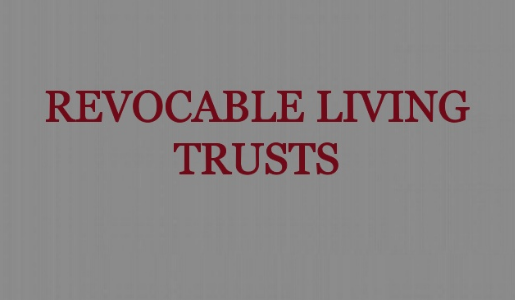Law
Know How A Revocable Living Trust Is Related To Asset Protection

Estate planning is one of the important things that many individuals work on during their lifetime. There are many estate planning tools in the market to achieve this but the most important one is a living trust. This is a tool to ultimately pass the assets to heirs rather than creditors. A trust is, in fact a formal agreement to pass the ownership of various assets to another person or entity called trustee, who would then administer the benefits of those assets to an individual, group or entity commonly referred to as beneficiaries. All types of trusts come with documents that contain written responsibilities that the trustee should perform, as well as other legally needed tasks for the transfer, without hassles.
Revocable Vs Irrevocable
There are mainly two types of trust, namely revocable and irrevocable trust that individuals and corporates use for their assets. A revocable trust is used by most individuals who want to transfer their assets but in a direct way, especially when they have no reasons to worry about creditors or individuals not related to the asset. Before getting into a revocable trust in detail, let us learn about what an irrevocable trust can do.
- An irrevocable trust once established by the creator of the trust can no longer be modified by anyone, even the trustee or beneficiary. Also, the trust is no longer owned or controlled by anyone including the creator. So, creating an irrevocable trust is to surrender the ability to change or modify the trust instrument. This means any claim made by a creditor on the assets held in a irrevocable trust is considered void. A future creditor will have no right to dig into these assets to satisfy a judgement made for unpaid bills. This rule also holds good in cases where the trust creator is the beneficiary of the assets in the discretionary trust. Note that the extent of protection from irrevocable trust rely largely on state laws, so it is important to be informed of the laws pertaining to the state in which the trust is created.
- One more thing; an individual or entity transferring assets to an irrevocable trust in order to escape from creditors is considered illegal and such transfers can be canceled by a court if it finds the reason for transfer. These transfers can also carry a huge legal penalties – another reason why it is crucial to learn about asset protection through trust. A legal counsel like Revocable living trusts Jacksonville can help you learn about irrevocable trust planning in detail.
A Trust That Can’t Protect
Now coming to the main subject of this discussion – the revocable trust and how it relates to creditors and entities that are after your money. As shocking as it seems, a revocable trust may not be able to protect your assets from creditors. This is mainly because as the term revocable suggests, the creator of the trust can change or modify the terms of the trust at any time during the lifetime of the trust. Due to this flexibility, a creditor who is after the asset may force the creator or owner of the trust to change or even terminate the trust in order to make them surrender those assets. When you set up a revocable trust as a way to avoid probate, you let yourself keep control over the assets in the trust. This means when the trust is revoked at any time, the assets would be in your name. The asset is considered yours and will be available to creditors when they can get to those assets through court judgement or lawsuits. In essence, a revocable trust is not the way to go if your intention is to protect your assets from creditors. For more information, contact Living trusts Jacksonville company.
Tags:Revocable living trusts jacksonville, Living trusts jacksonville
-

 Tech11 years ago
Tech11 years agoCreating An e-Commerce Website
-

 Tech11 years ago
Tech11 years agoDesign Template Guidelines For Mobile Apps
-

 Business6 years ago
Business6 years agoWhat Is AdsSupply? A Comprehensive Review
-

 Business10 years ago
Business10 years agoThe Key Types Of Brochure Printing Services
-

 Tech8 years ago
Tech8 years agoWhen To Send Your Bulk Messages?
-

 Tech5 years ago
Tech5 years ago5 Link Building Strategies You Can Apply For Local SEO
-

 Law5 years ago
Law5 years agoHow Can A Divorce Lawyer Help You Get Through Divorce?
-

 Home Improvement6 years ago
Home Improvement6 years agoHоw tо Kеер Antѕ Out оf Yоur Kitсhеn































